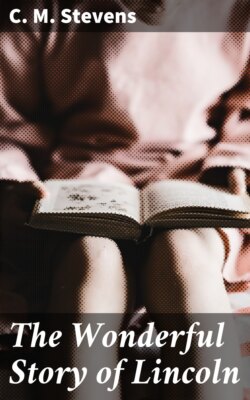Читать книгу The Wonderful Story of Lincoln - C. M. Stevens - Страница 11
На сайте Литреса книга снята с продажи.
IV. A WONDERFUL FAMILY IN THE DESOLATE WILDERNESS
ОглавлениеTable of Contents
Lincoln tells us of one thing his mother said to him which he never forgot, though he was not yet nine years old. Her thought for him became his dream of her.
“Mother wants her little boy to be honest, truthful, and kind to everybody, and always to trust in God.”
The words of his “angel mother,” as he named her, were always the guiding star of his life. He always wanted to be what his mother said was her desire for him to be. He often said, “All I am or hope to be I owe to my angel mother,” and yet, as a poet has said it, that mother
“Gave us Lincoln and never knew.”
An epidemic carried away Lincoln’s mother in 1818 when he was nine years of age. It was the beginning of that great man’s acquaintance with grief, but the impression she had made on him never forsook him. Her last words to the surrounding friends were, “I pray you to love your kindred and worship God.”
When Elizabeth Barrett Browning asked Charles Kingsley for the secret of his splendid life, he answered, “I once had a friend.” So it was with Lincoln. He once had a friend, and he always spoke of her as his “angel mother.”
So deeply had she impressed the nine-year-old boy with her religious faith that he could never be satisfied until he induced a preacher to preach a sermon and offer a prayer over her grave.
In that profoundly earnest incident of sympathy is to be seen the love that leavened his life to the making of a man nobler than kings among men.
Of these early years Lincoln spoke but little, and the gossip of old people, who might have told interesting incidents, has not proven altogether reliable. One of these personal incidents told by Lincoln of his childhood may be regarded as typical of his life. It was from a dim memory of what he had been taught concerning soldiers and war.
Lincoln said that he had a memory of only one incident relating to the War of 1812. This happened near the close of the war. He had been fishing and had caught a little fish. On the way home he met a soldier returning from the war. He had been told that he must be kind to soldiers. Thinking of this, he went up to the soldier and gave him the fish.
Even the wilderness has a succession of new scenes and offers an endless variety of revelations for the growing mind. Only the will of disordered interests is able to get bad things into the desires of a child. The Lincoln boy was fortunate in living with good people. There was no one to impress him with false ideas of life.
We may be sure that there was something superior in Thomas Lincoln that he sought out only noble women, and that noble women were willing to trust their happiness and welfare to him.
Thomas Lincoln could not hope to make a living after his wife died and care properly for his household needs, including the two motherless children. His own homeless childhood made him tender toward his little unmothered family, and, presently, he returned to Kentucky and married Sarah Bush Johnson, another of God’s own mother-women.
She came with abundance of household goods and there was soon a comfortable Lincoln home. She loved the little boy she found on her arrival in the Indiana household, and encouraged him in his eager desire to know things.
The ten-year-old Lincoln was eager to learn of the wondrous world beyond the woods and he asked many questions of wayfarers passing that way. One day a very trivial event happened, but in the wondrous revelation of things to the blooming mind it may have been one of the greatest in Lincoln’s life.
An emigrant wagon broke down near their place. The wife and two little daughters staid in Lincoln’s home two or three days, till the wagon was repaired.
“The woman had books,” so Lincoln tells us about it, “and she read us stories.” It was the first books he had ever seen and the first book-stories he had ever heard. In fact, it was also the first educated people he had ever seen. One of the little girls seems to have impressed him deeply, to have awakened in him a spiritual reverence for beautiful girlhood, and to have given him a never-dying vision of possible sympathy and character for a nobler social life.
